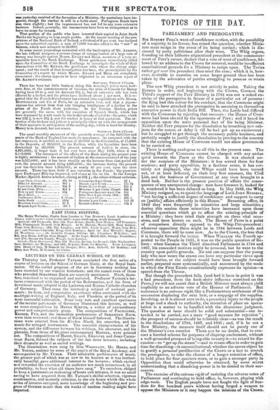LECTURES ON THE GERMAN SCHOOL OF MUSIC.
ON Thursday last, Professor TAYLOR concluded the first series of a course of lectures on the School of German Music, at the Royal Insti- tution. Of the earlier progress of the art in Germany nothing has 'been recorded by our musical historians; and the names even of those who preceded SEBASTIAN Baca are scarcely mentioned. Much, there- fore, remained to be explained and narrated. Professor TAYLOR'S lec- tures commenced with the period of the Reformation, and the form of devotional music adopted in the Lutheran and Roman Catholic churches of Germany. Then came the interesting subject of national part- music ; its form, and comparative excellence when contrasted with the madrigal-writing of England, Italy, and Flanders, at the period of its most successful cultivation. Some very rare and excellent specimens of the secular part-music of Germany illustrated this lecture, as well as some compositions by HENRY SCHUTZ, a writer of extraordinary power and comprehensive grasp. The compositions of PAcnELBEL, KEISER, Fux, and the immediate predecessors of SEBASTIAN Secs, were then reviewed ; and those of Baca himself followed. Theillustra- tions were selected from his Kireken Musik, his oratorios, and his music for stringed instruments. The essential characteristics of his system, and the difference between his writings, his character, and his pursuits, from those of his great contemporary HANDEL, were pointed out. The compositions of HASSE, GRATIN, EMANUEL and JOHN CHRIS- TIAN BACH, formed the subjects of the last three lectures ; including their dramatic as well as sacred writings.
The illustrations were sung by Miss WoonvArr, Mr. Hones, and Mr. YOUNG assisted by some of the pupils of the Royal Academy, and soeompanied by Mr. Tutu. Their admirable performance of music, the greater part of which was as new to its hearers as it was intrinsi- cally beautiful, gave additional interest to the lectures ; which excited and rewarded the attention of an audience not much accustomed, in all probability, to hear what old times have sung." To ourselves, obliged to keep a parsimonious reckoning of hours and minutes, it was no small saving to have acquired from Mr. TAYLOR'S skilful selection, vigorous condensation, and masterly criticism, in the six hours which this whole series of lectures occupied, more knowledge of the beginning and pro- Fess of German music than six weeks of random reading might have imparted.


























 Previous page
Previous page